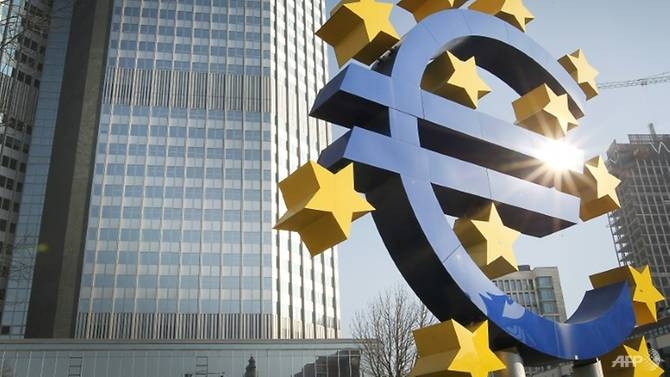ECB plans end to bond-buying if no new shocks for eurozone
 |
| The ECB's bond buys - currently set at €30 billion (US$35 billion) a month - and ultra-low interest rates are designed to stoke growth in the 19-nation single currency area. (AFP/Amelie QUERFURTH) |
"After September 2018 ... we will reduce the monthly pace of the net asset purchases to 15 billion euros until the end of December 2018 and then end net purchases," ECB President Mario Draghi told reporters in Latvian capital Riga.
But he injected a note of caution by making the step "subject to incoming data confirming our medium-term inflation outlook."
The ECB's bond buys - currently set at €30 billion (US$35 billion) a month - and ultra-low interest rates are designed to stoke growth in the 19-nation single currency area and power inflation to the bank's target of just below 2.0 per cent.
More than three years after Draghi unleashed the "quantitative easing" programme, he said a review of economic data and internal ECB forecasts convinced policymakers they were on course to reach the inflation goal.
"The news are not as good as they were a quarter ago, but they are still solid," he said.
RATES TO STAY LOW
The eurozone appears slightly winded after a string of positive economic data in 2017.
Growth slowed in early 2018, at 0.4 per cent between January and March compared with 0.7 per cent in the previous three months.
"We may well have this soft patch being somewhat longer ... in some countries," Draghi predicted, noting that the latest ECB projections include a downgrade in this year's economic growth forecast from 2.4 per cent to 2.1 per cent.
But "the underlying strength of the economy in the medium term is what we assess to be adequate," he said.
Meanwhile the central bank sees inflation more firmly on course, upgrading its predictions for 2018 and 2019 from 1.4 per cent to 1.7 per cent.
Price growth surged to 1.9 per cent in May, with higher oil prices the biggest factor lifting it to the ECB's target.
"Core" inflation discounting the most volatile elements remains weak, but the data suggest that QE has dispelled the risk of deflation, or a downward spiral of prices braking economic activity.
Draghi looked to reassure observers by promising that the current record-low interest rates will "remain at their present levels at least through the summer of 2019".
Meanwhile, the ECB will continue to reinvest its massive €2.4-trillion stock of bond holdings "for as long as necessary" to ease access to finance for firms and households in the 19-nation eurozone.
"The meeting marks another important step towards a gentle end to QE but at the same time, it does not mark the start of monetary tightening" that could dampen economic activity, said ING Diba bank analyst Carsten Brzeski.
The euro slid immediately following the announcement, falling from US$1.1818 ahead of the policy announcements to US$1.6425 around 1415 GMT - down 1.27 per cent on the day.
'NICELY DONE'
While the ECB's move is more definitive than some had expected, economist Frederik Ducrozet of Pictet bank highlighted via Twitter that its commitment to "tapering" or winding down bond purchases is "not an ironclad one".
Making the reduction in bond purchases "subject to incoming data" means governors are "retaining some flexibility, although the bar for policy change is arguably very high," Ducrozet wrote.
ECB chiefs may have felt the need for a fallback option when casting an eye over the long list of threats to the eurozone expansion.
Top of the list are unpredictable spending policies from the new Italian government, which could pitch the bloc's third-largest economy into a financial crisis - although fears for the sustainability of Italy's debt mountain have calmed since Economy Minister Giovanni Tria ruled out an exit from the euro Sunday.
Elsewhere, the prospect of a failure to reach a Brexit deal with London remains as real as ever, while higher oil prices could weigh on eurozone growth.
And an acrimonious end to Saturday's G7 summit heightened the risk of a tit-for-tat trade war between EU nations and US President Donald Trump.
"If we undermine the multilateral framework that has accompanied our existence since the Second World War ... then we are going to create very serious damage," Draghi warned.
But he also pointed to potential "positive surprises" for the economy from higher government spending in the US and some eurozone countries.
The clouds of uncertainty made today's decision "a truly Solomonic compromise" between hawks eager to end support for the economy and doves fearful of undermining the expansion, Brzeski said.
"The hawks finally got their end-date for QE, while the doves still have their open door for more if needed," he noted.
What the stars mean:
★ Poor ★ ★ Promising ★★★ Good ★★★★ Very good ★★★★★ Exceptional
Related Contents
Latest News
More News
- Cashless payments hit 28 times GDP in 2025 (February 04, 2026 | 18:09)
- SSIAM and DBJ launch Japan Vietnam Capital Fund (February 04, 2026 | 15:57)
- Banks target stronger profits, credit growth in 2026 (February 04, 2026 | 15:43)
- Vietnam on path to investment-grade rating (February 03, 2026 | 13:07)
- Consumer finance sector posts sharp profit growth (February 03, 2026 | 13:05)
- Insurance market building the next chapter of protection (February 02, 2026 | 11:16)
- NAB Innovation Centre underscores Vietnam’s appeal for tech investment (January 30, 2026 | 11:16)
- Vietnam strengthens public debt management with World Bank and IMF (January 30, 2026 | 11:00)
- Corporate bond market poised for stronger growth cycle (January 28, 2026 | 17:13)
- Vietnam's IPO market on recovery trajectory (January 28, 2026 | 17:04)

 Tag:
Tag:




















 Mobile Version
Mobile Version